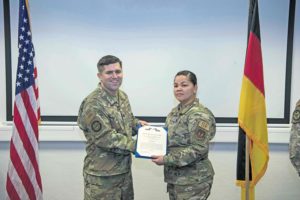
The day started like any other for U.S. Air Force Technical Sgt. Heather R. Sanchez, 86th Security Forces Squadron Installation Access non-commissioned officer in charge.
She checked emails and spoke with Airmen at the Visitor Control Center near the West Gate. At the front of the VCC sat one of her Airmen — a “pipeliner,” who prepared for their first day at their first duty station.
“It’s crazy because it was Airman 1st Class Thompson’s first day on the job,” said Sanchez. “A family walks in, a husband, his wife, and his mom, and approach Thompson’s desk to get visitor passes. As they were filling out information, Thompson noticed the elderly woman appeared very faint… and that’s when it happened.”
The mother collapsed to the ground.
“She’s not breathing, she’s not breathing!” multiple Airmen said in near unison.
Sanchez soon made her way to the unconscious individual and took control of the scene until medical staff arrived.
“I knew I’d have to get into action, as far as doing CPR because she wasn’t breathing and remained unresponsive,” said Sanchez.
During CPR, Sanchez performed a set of 30 chest compressions in an attempt to ensure blood flow to the brain.
Following the chest compressions, Sanchez instructed the woman’s son on how to perform the “two-breaths,” mouth-to-mouth resuscitation — a standard practice in CPR following 30 chest compressions.
“So, he did the two-breaths and then I did another set of 30 chest compressions after,” said Sanchez. “On the second set of chest compressions, I think it was maybe the 22nd or 23rd rep, she came back. She began breathing normally, and so on and so forth.”
It wasn’t until medical help arrived after some of the adrenaline had worn off, that Sanchez was able to take a step back and look at the bigger picture. At that moment, she realized she saved a life.
As luck would have it, Sanchez was a CPR instructor for three years and received additional training months before the incident occurred. Sanchez followed her training in text-book fashion and as she recalled the memory, she thinks that’s the key takeaway.
“A lot of times in our training we often simulate and don’t practice how we play in real-world situations,” said Sanchez. “Training is paramount because when others are relying on you, you’ll only have your training to rely on.”
Sanchez was pleased to learn the woman is stable and back in good health. Sanchez said, overall, the situation made her think about her one loved ones even more.
“I grew teary-eyed because I saw this woman and thought about my mom,” said Sanchez. “My mom is around the same age and I felt shocked knowing this could have been her. Once medical assistance arrived, I had to call my mom. I just needed to check up on her.”
On Jan. 17 Sanchez received the U.S. Air Force Achievement Medal for her heroic act.


